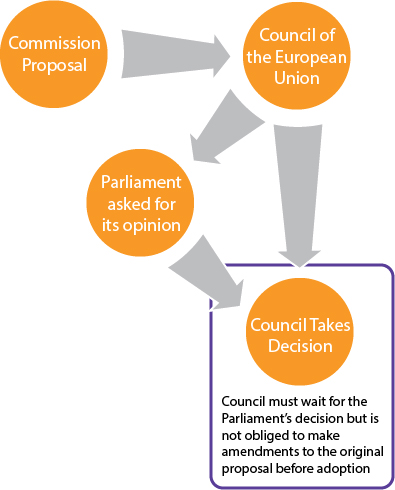The Special Legislative Procedures: Consultation
Under the consultation procedure the Commission and the Council are only required to consult the European Parliament on legislative proposals. This means that if the Council so wishes, it may enact legislation that the European Parliament does not approve of. Click here to read a description of the consultation procedure from the Europa website
Under the consultation procedure, the Council can vote using qualified majority voting if necessary, however, in practice consensus is often achieved.
A powerless Parliament?
Despite its lack of veto power within this procedure, the Parliament is not completely powerless to act in the face of legislation it opposes. Thanks to the ‘isoglucose’ ruling of the ECJ in 1980 (case 138/79), where the ECJ stated that the Council must wait for Parliament’s opinion prior to adopting legislation; thus, Parliament has a valuable delaying power.
In cases when the Parliament is unhappy with proposed legislation, it can postpone making a decision and lobby the Commission to change the proposal. This does not constitute a veto, as the Parliament is unable to withhold its opinion permanently. However it does at least make sure that the Parliament’s opinions are taken into account.
The consultation procedure in diagrammatic form…

Before the 1980’s and the adoption of the Single European Act, the consultation procedure was the most common form of decision making procedure in the EU. Reflecting a long term shift towards more involvement of the Parliament in decision making, the consultation procedure is now only used in a small number of areas such as internal market exemptions and the competition law.
Consultation Key Facts
- Commission makes a proposal
- Parliament is asked for its opinion before the Council can act
- The Council cannot act until it receives the Parliament’s opinion, however the Parliament cannot permanently delay its opinion
- The Council acts by consensus but can use QMV
Consultation Key Features
- No Parliament veto
- Parliament is only able to exert some power by delaying
- Power rests with the Council so this process can be seen as largely intergovernmental
Calendar
| M | T | W | T | F | S | S |
|---|---|---|---|---|---|---|
| 1 | ||||||
| 2 | 3 | 4 | 5 | 6 | 7 | 8 |
| 9 | 10 | 11 | 12 | 13 | 14 | 15 |
| 16 | 17 | 18 | 19 | 20 | 21 | 22 |
| 23 | 24 | 25 | 26 | 27 | 28 | 29 |
| 30 | 31 | |||||
Leave a Reply